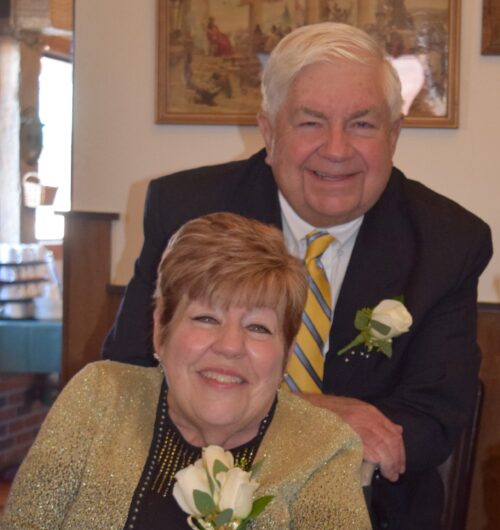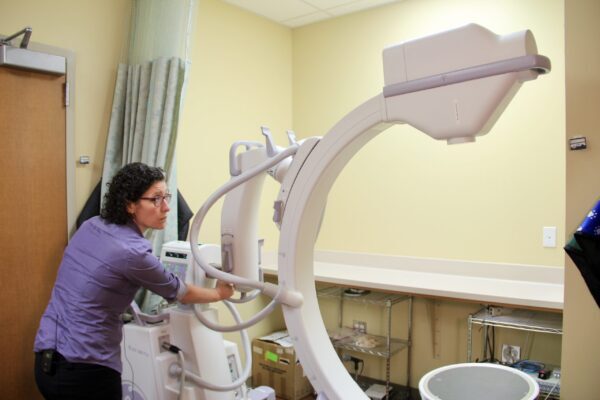Purdue I-EaT Lab receives $175K in gifts to accelerate dysphagia research
Written by: Tim Brouk, tbrouk@purdue.edu
A heartfelt financial boost will enhance Purdue University’s research of dysphagia — or swallowing disorders – and its treatment. Dysphagia is most often found in patients suffering from stroke, head injury, head and neck cancer, multiple sclerosis, and many other health problems that affect the head and neck.

Dave Greulich gifted $175,000 to the Purdue University I-EaT Lab, which studies dysphagia. The gifts are in memory of his late wife, Deanna Greulich.Photo provided
The Purdue Imaging, Evaluation, and Treatment (I-EaT) of Swallowing Research Lab received a $150,000 gift and a $25,000 endowment from David “Dave” C. Greulich, a Purdue School of Mechanical Engineering alumnus living in Cincinnati, Ohio. The gift will be disbursed in $30,000 increments through 2025. Income from the endowment will be awarded to student researchers in the lab. Both are in the name of Greulich’s late wife of 53 years, Deanna “Dee” M. Greulich.
Dee passed away March 16, 2021. A leading factor in her death was her development of dysphagia after multiple surgeries, including one on her neck. Despite the condition affecting one in every 25 adults in the United States per year, according to the American Speech Language Hearing Association, Dave Greulich believes it is still under the radar.
“It was totally out of the blue. It caught us both by surprise. Since then, I realized it shouldn’t have caught us by surprise. It appeared to be long-developing and pretty much ignored,” said Greulich.
This closed a chapter of a lifelong love story for Dee and Dave. Dave met Dee on a blind date in their hometown of Louisville, Kentucky, just two weeks before he embarked to study at Purdue. The couple dated through college and were married after Dave’s Purdue graduation and Dee’s graduation as a registered nurse. They then moved to Cincinnati, grew a family and pursued their careers. They both retired in 2009.
While researching the disorder online, Greulich discovered the I-EaT Lab and quickly contacted Georgia A. Malandraki, I-EaT Lab principal investigator, associate professor in the Department of Speech, Language and Hearing Sciences (SLHS), and president-elect of the Dysphagia Research Society. Georgia was happy to lend her expertise to the widower.

Georgia Malandraki utilizes powerful X-ray equipment to study dysphagia in her I-EaT Lab.Tim Brouk
“One of the worst aspects of dysphagia is when food and drinks go into the airway instead of the stomach,” Malandraki explained. “If that happens repeatedly, you are more prone to developing infections like pneumonia. Further, the quality-of-life ramifications of dysphagia can also be detrimental, especially in our society, where food and drinks are part of almost every aspect of social life.”
Understanding more about dysphagia helped Dave Greulich’s healing after his wife’s passing. It also inspired him to help.
“Problems of the neck or causes of dysphagia should be treatable; why does (dysphagia) have to be an incurable condition, something where someone says ‘Oh there’s no hope for her. That’s the way it is’?” Gruelich asked. “In researching that question, I found out about the I-EaT Lab and how they are working on that very thing.”
The love story continues in a way. His mission is to help amplify and accelerate the work of the I-EaT Lab and to make the dangers of dysphagia more known.
“Dave wants more people to learn about this condition. He wants it to be part of mainstream medicine, and that is one of our missions too,” Malandraki said. “Most primary care doctors won’t ask questions about swallowing as you get older. Dave’s dream is to make it a standard of care, so that medical professionals ask about it, so it’s on everybody’s radar. We are happy to help in this as much as we can.”
Money already being utilized
One of Malandraki’s ongoing research projects is the development of wearable sensors and specialized software that measure muscle activity in dysphagia patients and provide immediate targeted biofeedback during swallowing therapy. The improved reusable sensor that Malandraki developed in the past year in collaboration with SLHS Research Technology Specialist Kevin Berry, is worn under the chin and was developed to help with the rehabilitation and tele-rehabilitation of dysphagia. It will ultimately also help in the early detection of the condition.
Greulich’s generosity has expedited mass production of the sensors and improvements in the software. Production of the sensors began in January in a Pennsylvania manufacturing plant.
“We used to make the sensors here in one of our department’s wet labs. It would take our team almost one day to make one sensor,” Malandraki said. “The sensors we have been able to now order are more standardized and reliable than what we could develop by hand. Dave has already made a difference in our research. In great part because of his help, in the summer we will be able to start a pilot clinical trial with patients. We will be using some of our systems in our clinic and sending some to patients’ homes, and we will be testing how well they work in each environment.”
Greulich said Malandraki’s work falls in line with Purdue’s penchant of putting ideas into substantial action. The work in the I-EaT Lab has the potential of being immediately beneficial and impactful.
“In the I-EaT Lab, they have a lot of good stuff coming, but they were just short of money. We wanted to take them to the next level, the next step. That’s where the funding ought to go. I look at Purdue in general as a place where things are done, not just talked about,” he added. “Instead of writing a book and publishing about it or self-glorifying activities, they’re doing things that are tangible to help people. That’s an attractive feature.”
Student support, too
The $25,000 endowment in Dee’s name will support student research awards, students’ attendance at conferences and other student-related event costs. Malandraki and Greulich agreed this money will help reward and motivate students’ hard work toward early detection and treatment of dysphagia.
After a 2021 visit to the I-EaT Lab after Dee’s death, Greulich said his wife would have been impressed by the work of Malandraki and her student research assistants. The work falls in line with Dee’s nursing career and lifelong love of helping people, especially those suffering from health concerns.
“That was her signature: caregiver,” Dave Greulich said. “It would have amazed her because that sort of rehab and maintenance was something she focused on in her working career.
She wanted to get her patients back to work to be productive again, not just good enough to get out of the hospital or healthcare facility.”
The Greulich’s link to I-EaT and the lab’s connection to the family should propel dysphagia research at Purdue to new heights while bringing more attention to the disorder’s dangers.
“Ultimately, he wants to improve care for patients with dysphagia, and that’s my life’s goal, too,” Malandraki said. “We share the same vision.”